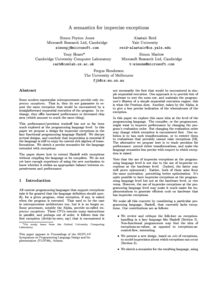A Semantics for Imprecise Exceptions
[pdf] [doi]
Proceedings of the 1999 ACM SIGPLAN Conference on Programming Language Design and Implementation (PLDI '99)
Atlanta, Georgia, USA
May 1999
Abstract
Some modern superscalar microprocessors provide only imprecise exceptions. That is, they do not guarantee to report the same exception that would be encountered by a straightforward sequential execution of the program. In exchange, they offer increased performance or decreased area (which amount to much the same thing).
This performance/precision tradeoff has not so far been much explored at the programming language level. In this paper we propose a design for imprecise exceptions in the lazy functional programming language Haskell. We discuss various simpler designs, and conclude that imprecision is essential if the language is still to enjoy its current rich algebra of transformations. We sketch a precise semantics for the language extended with exceptions.
From the functional programming point of view, the paper shows how to extend Haskell with exceptions without crippling the language or its compilers. From the point of view of the wider programming language community, we pose the question of whether precision and performance can be traded off in other languages too.

BibTeX
@inproceedings{DBLP:conf/pldi/JonesRHHM99 , abstract = { Some modern superscalar microprocessors provide only imprecise exceptions. That is, they do not guarantee to report the same exception that would be encountered by a straightforward sequential execution of the program. In exchange, they offer increased performance or decreased area (which amount to much the same thing).This performance/precision tradeoff has not so far been much explored at the programming language level. In this paper we propose a design for imprecise exceptions in the lazy functional programming language Haskell. We discuss various simpler designs, and conclude that imprecision is essential if the language is still to enjoy its current rich algebra of transformations. We sketch a precise semantics for the language extended with exceptions.
From the functional programming point of view, the paper shows how to extend Haskell with exceptions without crippling the language or its compilers. From the point of view of the wider programming language community, we pose the question of whether precision and performance can be traded off in other languages too. } , acceptance = {20} , affiliation = {Yale University and Microsoft Research and Cambridge University and University of Melbourne} , ar_file = {PLDI_99} , ar_shortname = {PLDI 99} , author = {Simon L. Peyton Jones and Alastair Reid and Fergus Henderson and C. A. R. Hoare and Simon Marlow} , booktitle = {Proceedings of the 1999 ACM SIGPLAN Conference on Programming Language Design and Implementation (PLDI '99)} , day = {1-4} , doi = {10.1145/301618.301637} , editor = {Barbara G. Ryder and Benjamin G. Zorn} , file = {except.pdf} , location = {Atlanta, Georgia, USA} , month = {May} , pages = {25--36} , png = {except.png} , publisher = {ACM} , title = {{A} Semantics for {I}mprecise {E}xceptions} , year = {1999} }